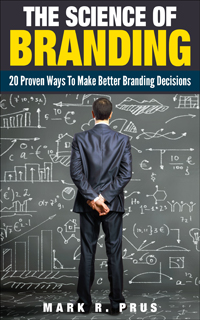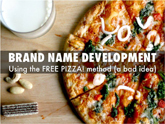Mark
How To Communicate With Anyone
Just Understand How People Process Information

If you’ve ever wondered why you understand things that other people do not, you might have a different learning style than other people. Or maybe you are frustrated because you cannot get other people to understand your point of view. Again, different learning styles might be the cause.
In the field of education, it is widely recognized that students have various learning styles. One of the most widely used summaries of learning styles is Neil Fleming’s VARK model (https://vark-learn.com/) which categorized people into 4 classifications:
1. Visual Learners — People who have a preference for learning from pictures or visual aids
2. Aural Learners — These people learn through listening
3. Reading-Writing Preference Learners — Those who learn through reading & writing
4. Kinesthetic Learners — People who learn through moving or active exploration
If you are trying to do a better job of communicating with someone, you can get them to do the VARK questionnaire on that website to evaluate which communication style is their preference. Once you figure it out, then you will know how to effectively communicate with him/her!
The International Journal of Linguistics and Communication (Vol. 5(1), June 2017) has a fantastic summary of the ways to appeal to each type of learner. Check this out!
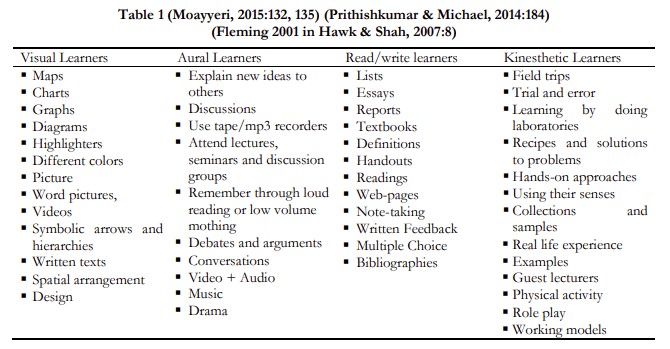
When looking at learning styles, what is fascinating to me is there are few people who are 100% of any of these modalities (data from VARK website). Fewer than 2% of people are exclusively Visual Learners. Only 4.2% of people are exclusively Read/Write. Only 5.1% are exclusively Aural Learners. The biggest block of exclusive learners is Kinesthetic at 22.8%.
And yet, how many of us try to communicate with someone in a single way (usually by writing only or by talking only)?
Combining modalities enhances learning and gets your message across to more diverse people. Therefore, communication approaches that combine modalities (such as the visual and the auditory) can be beneficial to recall and persuasion of your messaging. In fact, the largest group of learning preferences is the VARK grouping shown in brown below, which combines all 4 classifications of learning.
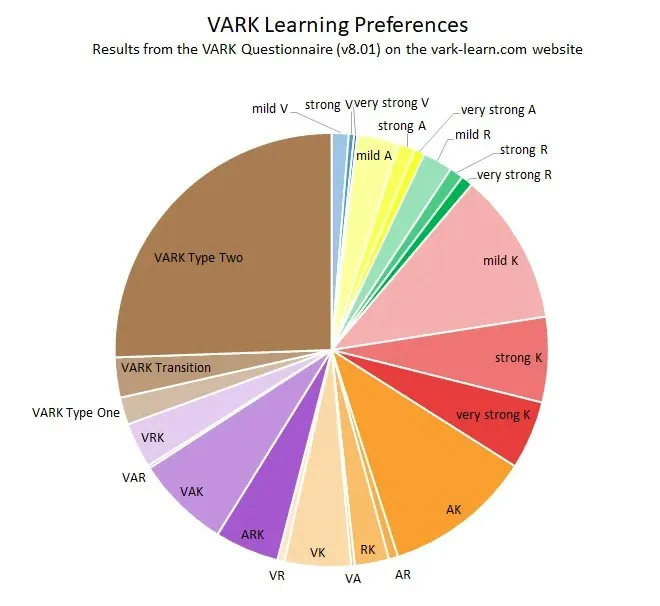
The moral of the story is simple. To enhance your communication, engage as many human senses as possible in it.
Here is a practical example from television advertising: “Snap, Crackle, Pop — Rice Krispies!” If you are of a certain age, you not only heard the jingle that went along with that phrase, but you also heard the cereal itself (which really does pop when milk is poured on it). “Plop, plop, fizz, fizz, oh what a relief it is” is another good example, as that jingle for Alka-Seltzer built a million-dollar business (and, yes, the product performs as advertised). Both examples used visual, aural, and read/write modalities to get the message across.
If you want the “quick course” on engaging the senses, you should buy this amazing book: “A Natural History of the Senses” by Diane Ackerman. She touches upon all of the senses and explores the depth and breadth that can be reached in each one. I can assure you, you won’t think of the five senses in the same way after reading this book.
Obviously multisensory communication is not possible in every situation. But if you want to communicate in a way that maximizes the number of people who understand your message, you should use as many senses as possible:
· Work hard to insert quality visuals into your articles.
· Provide a podcast for aural learners.
· And make sure you have a hands-on guide that gets people working right on the spot.
Your communication will benefit from this effort!
3 Really Is the Magic Number
If you can’t make your point in 3 then start over

Schoolhouse Rock fans already knew this, but it took a January 2014 publication in the Journal of Marketing for marketers to get confirmation.
The publication was titled: “When Three Charms but Four Alarms: Identifying the Optimal Number of Claims in Persuasion Settings.” The authors Suzanne B. Shu & Kurt A. Carlson conducted a study where consumers were shown messaging that consisted of one, two, three, four, five and six positive claims about a product such as shampoo or a breakfast cereal or even a politician. For example, in the case of the “six claim” breakfast cereal situation, participants were told:
Imagine that you are shopping at the grocery store and you notice that a brand of cereal you sometimes buy has a new package design. As you look closer you discover that they have also changed the product itself. The packaging says that it is now:
“Healthier, better tasting, crunchier, sweeter, organic, and with higher quality ingredients.”
After the participants saw the messaging, the researchers measured the attitude of each respondent to gather positive or negative impressions. They also measured the amount of skepticism the respondent had about whether the messaging was intended to inform them or to push them to choose a particular product.
The results clearly demonstrated that those who read three claims rated all of the subjects of the ads (e.g., breakfast cereal or politician) significantly more positively than respondents who had read the ads with one, two, four, five or six positive claims. The results seemed to indicate that adding additional positive claims increased appeal until the third claim, but after the third positive claim, additional claims increased skepticism which in turn lowered the overall level of persuasion.
The key is to avoid the “piling on” effect. You know how this goes…one superlative is good so two must be better so three is even better and four must be even better. There is a limit to the patience of your target market and that limit seems to top out at 3.
I’ve been tracking this trend for two decades. I credit Procter & Gamble® for starting the trend of “piling on” the benefits when they launched the Olay® Total Effects line in 2001 and introduced us to “Anti-aging skin care products that moisturize and fight seven signs of aging.” In case you don’t know, the “seven signs of aging” are “look of fine lines and wrinkles, rough texture, uneven skin tone, surface dullness, appearance of prominent pores, noticeability of age spots, and dryness.”
And wouldn’t you know it, Olay Total Effects works on all seven signs of aging (imagine that). The skeptic in me thought that maybe there were more signs of aging that Olay was not designed to work on, but I let it go and credited P&G with some good marketing insight.
The skeptic came back when I noticed Iams® advertising that provided “Seven Signs of Healthy Vitality.” Iams is another Procter & Gamble product.
And guess what…Head & Shoulders® (another P&G product) has “Seven Benefits” …fights dryness, calms itching, relieves irritation, reduces redness, controls oiliness, removes flakes, and beautiful hair.
In the next decade (2010’s), companies seemed to shift down from 7 to 5. Procter & Gamble’s Gillette® Fusion ProGlide Irritation Defense Shave Gel helps defend against the 5 signs of shaving irritation (nicks & cuts, burning, stinging, redness and tightness). Degree® deodorant offers “5 in 1” protection. Garnier® BB Cream claims to offer 5 instant results (evens tone, hydrates, renews, protects and brightens).
The cutdown from 7 to 5 reflected the ability (or lack thereof) of people to store things in their short-term memory. The classic study from 1956 by George Miller demonstrated that the maximum number of items the average person could retain in their short-term memory was seven. This supposedly was the basis for telephone numbers being seven digits long. An updated study in 2001 by Cowan (“The Magical Number 4 in Short-Term Memory: A Reconsideration of Mental Storage Capacity.” Behavioral and Brain Science 24 (2001): 87–185) found that the magic rule of seven was not true anymore and that the updated maximum is four. I would venture that if they ran the study today, 3 would be the magic number.
There could be a lot of different reasons for this including the aging of the US population (perhaps becoming more forgetful) or the fact that a more cluttered media environment makes it harder for people to retain information in short-term memory. But the key is to realize that the ability of people to retain information in short-term memory appears to be dropping.
Here is a brand that seems to be getting it right these days (ad in Costco magazine):
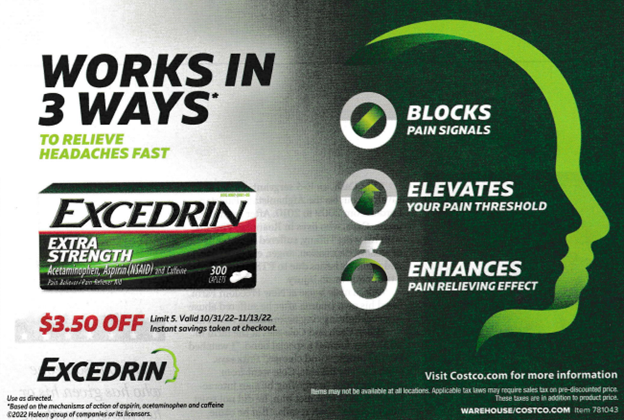
Face it. 3 is THE magic number. Shakespeare knew it (“Friends, Romans, Countrymen”). Our Founding Fathers knew it (“life, liberty, and the pursuit of happiness”). Abraham Lincoln knew it (“Government of the people, by the people, for the people”). And now you know it too!
Curiosity Killed the Cat
But It Really Revs Your Brain!

Photo by Cleyton Ewerton on Unsplash
Almost everyone loves a good magician. The magician’s sleight of hand technique in making a coin or playing card disappear/reappear delights us, as we usually take pleasure in being fooled in this manner. Once fooled, our curious brain rapidly kicks into gear and tries to figure out how the magician did the trick. Sometimes you figure it out, and then you get even greater pleasure. Even when you can’t figure it out, you are still amazed!
Magic tricks only work if two things occur. First, the magician must divert your attention away from where the actual trick is happening, and second, your brain must fill in any missing information by combining what you already know with whatever you perceive at that very moment. Truth be told, the magician is not creating the illusion — your brain is creating the illusion that something has happened (when in reality the magician has done something else).
The science behind the brain’s “filling in” process is fascinating (read this Discover magazine article). The sub-headline of the article says it all: “The eye and brain work in a partnership to interpret conflicting signals from the outside world. Ultimately, we see whatever our brains think we should.”
Here is a great example of how the “filling in” process works. Quickly read the paragraph below:
It deosn’t mttaer in waht oredr all the ltteers in a wrod are. You can stlil raed it wouthit a porbelm bcuseae the huamn mnid wroks by a porecss of ptatern rceigontion. It dtemrines maennig bfoere porecssnig dteails.
Isn’t tihs amzanig? Your brain can make sense of even the most chaotic situation.
Another way the brain “fills in” to provide a seamless reality is dealing with blind spots. I’m not talking about the areas where you cannot see in the rear-view mirror of your car! I’m talking about the significant gaps that exist in your vision. You may not be aware of them, but there are parts of your retina that have no photoreceptors and therefore you are essentially blind in that area. Nevertheless, your brain fills in those gaps so your perception of reality is flawless.
The “filling in” process has been shown in numerous studies to be important to generating lasting recall and favorable persuasion of messages and experiences. If the person’s brain is engaged and filling in the gaps, then the person will remember the experience and usually be favorable towards it.
By engaging with a mind puzzle, your brain is demonstrating curiosity. Author Ian Leslie describes curiosity as a combination of intelligence, persistence, and hunger for novelty in his book Curious: The Desire To Know And Why Your Future Depends On It. He makes a strong argument that maintaining curiosity is critically important as we grow older and are subjected to ever-increasing demands on our focus.
In their Psychology Today article The Mind of the Puzzler psychologists Sternberg and Davidson argued that solving puzzles entails the ability to compare hidden information in a puzzle with information already in memory. More importantly, in order to solve a puzzle, the brain must combine the two types of information to form novel ideas. When the brain successfully identifies the pattern or twist that the puzzle entails, you will typically get an “Aha! Effect” which leads to a positive emotional feeling as well. Challenging your brain with puzzles has been shown to improve memory and brain function in numerous clinical studies (here is the latest).
Another great way to engage your curious brain is to read mysteries. Mysteries are often more engaging than puzzles because often there is no definitive answer as there is with a crossword puzzle. Mysteries are murkier, and the brain likes to be challenged with questions that are complex and interrelated.
Curiosity has been shown to be a great benefit to the human brain. We should all strive to be more curious about our lives, especially as we get older. So read a great mystery or do a daily crossword puzzle! Engage with a different group of people. Learn some new skills. Your brain will thank you later!
Simpler Is Better
Why is everything so complicated these days?
Case in point. Starbucks Drink Sizes:
Short (8 Oz.)
Tall (12 Oz.)
Grande (16 Oz.)
Venti (Hot — 20 Oz., Cold — 24 Oz.)
Trenta (30 Oz.)
Brooklyn Fare had some fun with this in their coffee cup redesign, but there is a real point to be made here. Why do we complicate things?

Why can’t the coffee sizes at Starbucks be:
Short becomes Mini
Tall becomes Small
Grande becomes Medium
Venti becomes Large
Trenta becomes Extra Large
Want more evidence of how companies are complicating things? Here are the sizes of ice cream at Cold Stone Creamery:
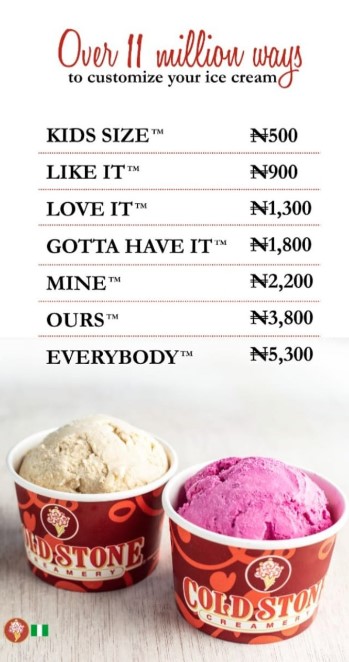
Imagine trying to order the proper size without referring to this menu. What ever happened to small, medium and large?
Science is solidly in the camp of simplicity. Adam Alter and Daniel Oppenheimer hypothesized that people would have an affinity for simple names that are easier to pronounce. They used names of fictitious stocks that were either hard to pronounce (i.e., Sagxter, Xagibdan) or easy to pronounce (i.e., Slingerman, Vander). They told respondents that these were real companies and asked them to estimate the future performance of the company. People indicated that the easily pronounced stocks would increase in value and the more complicated sounding stocks would decrease in value. Furthermore, the researchers then examined actual stock performance for 89 randomly picked stocks that had an initial public offering between 1990 and 2004. The stock performance for the first year of easily pronounced stocks was significantly higher than that of stocks with more difficult names. Simpler is better.
A study at the University of Michigan looked at fluency, familiarity and risk perception in names. In one study, the researchers asked participants to rate the potential harm of food additives with easy and difficult to pronounce names. Consumers consistently rated names that were difficult to pronounce as being more risky than those additives with names that were easy to pronounce. Simpler is better.
In another study, the University of Michigan researchers asked people to assess whether amusement park rides would be adventurous and exciting, or too risky and likely to make them sick, solely based on the name. Consistent with the food additive study, participants rated rides with difficult names unfavorably. The researchers concluded that “people perceive disfluently processed stimuli as riskier than fluently processed stimuli.” In other words, simpler is better.
A local food court has a chicken restaurant that has rebranded. They used to be known as “chickenow” which is a linguistically difficult and complex name.
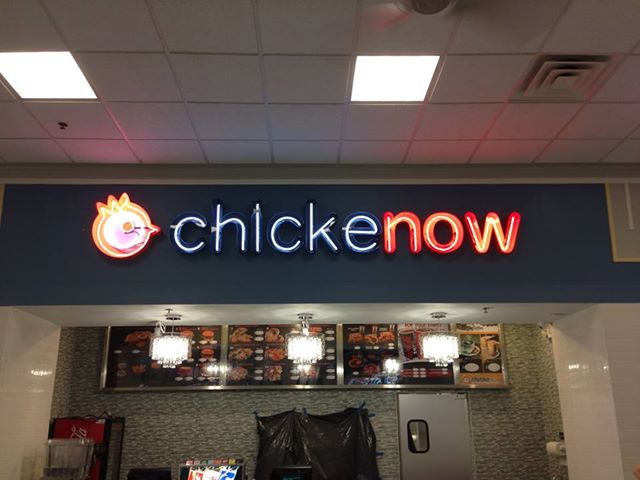
Recently they rebranded to “Chicken & Fries.”
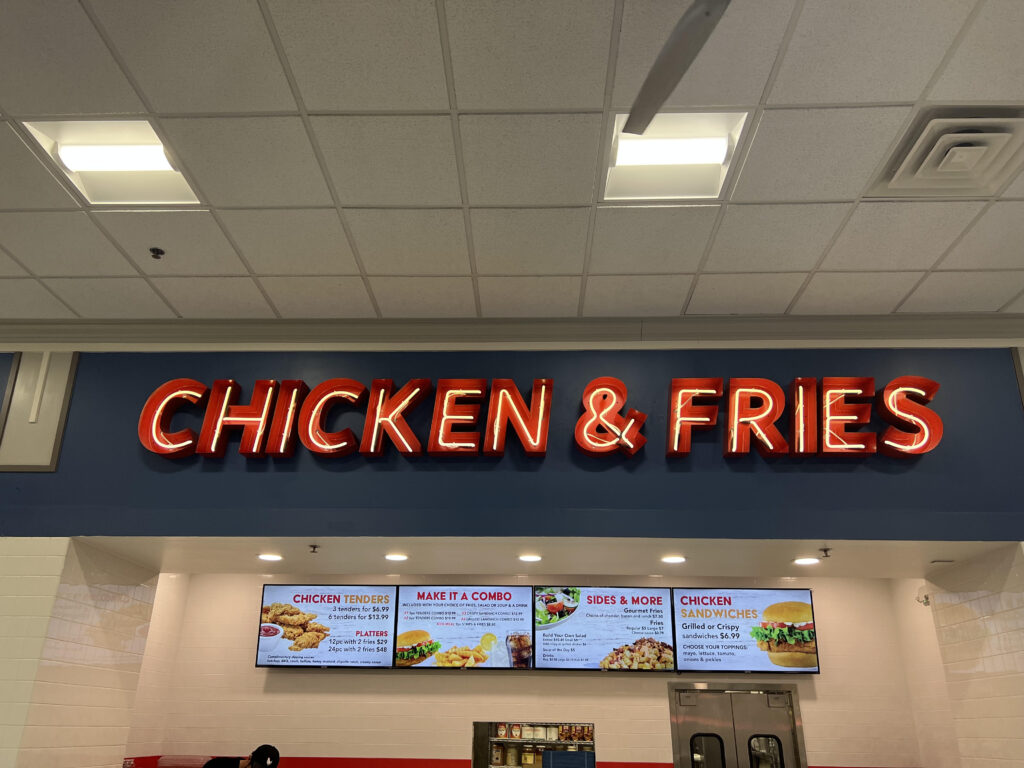
If you want to get picky you could argue that “Chicken & Fries” has gone too far into the generic camp. But you won’t ever be confused about what you can buy there.
Simpler is better. C’mon people, let’s simplify!
We Count Only Blue Cars
To Be More Memorable, Be Familiar (But Different)
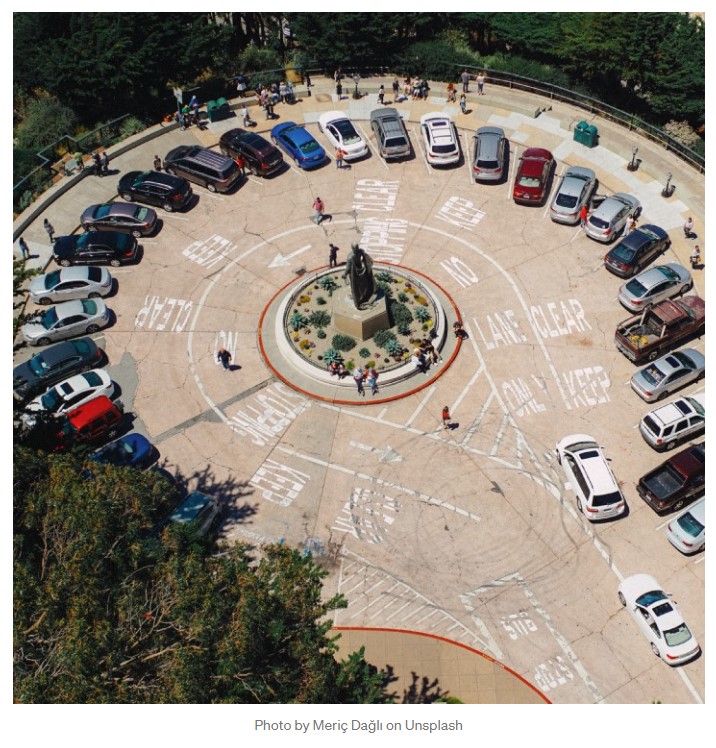
There is a simple technique that can make you or your actions more memorable. The key is to be familiar (but different).
Want to have your creative efforts stand out? People who are creative are perceived as being different, but you don’t want to be too different because being too different is borderline weird and few people want to be around weird.
Want to advance up the Corporate Ladder? Usually people who fit in (are familiar) will advance faster but you don’t want to be too familiar because you will blend into the sameness around you.
The sweet spot is the intersection of familiar and different. Or more correctly, you need to start with the familiar and add some differentiation. Familiar (but different) is a comfortable way to be more memorable because the human brain is comfortable with the familiar but detects the differences and works hard to make sense of them, thereby making the experience a memorable one.
Here is a visual way to demonstrate the issue. In the three groups of circles shown below, the circle in the center is always the same size. However, as you can see, the center circle looks smaller or larger based upon the size of the other circles surrounding it. The group of circles on the right has six similarly sized circles, and you can see how it is impossible to distinguish one from another. If you want to stand out, it is far better to be the outlier, such as the center circle in the first two groups of circles. But being a triangle in a group of circles might be perceived as being too different.
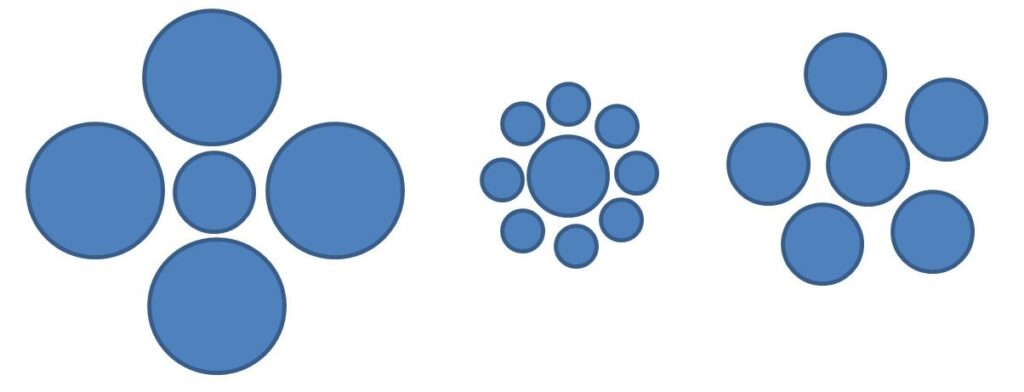
Familiar (but different) works because our brains are wired to find differences. Perhaps this goes back to the need to be aware of the presence of threats like man-eating animals. Or maybe we just don’t overburden our brains with information about things that are familiar, but when differences appear we start to pay attention.
In his landmark book, Thinking, Fast and Slow, Daniel Kahneman discusses the differences between two types of thinking: System 1 and System 2. System 1 thinking is based in our intuitive system and is quick, automatic, effortless and emotional. This is the type of thinking that causes people to make “snap” judgments and fail to observe subtle differences. System 2 thinking is slower and more conscious, logical and “deeper.” System 2 thinking creates more memorable events.
Here is an example from the world of branding. In the Philippines there is a very famous burger joint called “Regrub.” The food is great and is no doubt a major reason for their success. But a good part of their awareness comes from the fact that their name has a lot of people thinking, “Why did they name it Regrub?” After they ponder for a while, they then realize that it is the word “Burger” spelled backwards. They then go on to tell their friends about the new place with the unique name which helps to build the success story.
There are many examples in the art world. Andy Warhol created high impact paintings of familiar images such as Campbell’s Soup Cans or Brillo boxes. Even his famous portraits of Marilyn Monroe and Elvis Presley were made from common close-up photos of celebrities. Andy became famous by making the familiar different.
“We count only blue cars” is a lyric from the hit song “Counting Blue Cars” by Dishwalla. This lyric is actually a wonderful observation of human nature. If you only saw white cars all day long, then blue cars would be something special and you would pay attention to them. Life is like that often where the sameness seems to pass by without being noticed. To be memorable, you need to be familiar (car) but different (blue). In that way you’ll be noticed and remembered!
Liquid Death – Good Branding or Good Marketing?
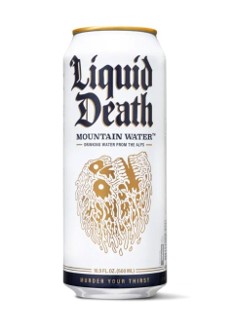
Let’s get this out of the way. Liquid Death is just water sold in beer cans. OK, now they are moving into flavors and fizzy water, but the brand was built on “mountain water in a beer can.”
So how do you explain their success (they recently closed another round of fundraising bringing its valuation to $700 million)? Is it the Branding or the Marketing behind the Branding?
Its latest investor, Peter Pham, seems to credit the name as he wrote in a Medium post that “Like Tesla moved drivers toward better-for-the-planet EVs through a great product and brand that became part of culture,” Pham wrote, “Liquid Death is moving people toward healthier and sustainable drinking options, not by preaching to them, but by entertaining them and making them a part of something bigger in culture.”
Others have credited the unique packaging and subversive marketing which has used bizarre ads (e.g., Martha Stewart Severed Hand https://liquiddeath.com/pages/martha) and Twitter influencers to define the brand as fast growing and a true disruptor in the non-alcoholic beverage market.
The way I make the call is to look at one without the other. If Liquid Death was on the shelf without the marketing would it work? Probably not. If the marketing was used to sell another brand of water in a beer can would it work? Probably, depending upon the name. So my conclusion would be the marketing is the hero, and the brand was the platform that enabled the success. Together they obviously are a great success. But in my opinion, the Liquid Death name is not the lynchpin as any of a number of names would have worked just as well with that fantastic marketing.
Douchebags. A Lesson in Name Development.
From the Merriam-Webster Dictionary
douchebag (noun)
douche·bag | \ ˈdüsh-ˌbag \
- usually douche bag: a bag used for giving douches; a rubber douche bag
- chiefly US slang: an obnoxious, offensive, or disgusting person
From the Urban Dictionary
Douchebag
Noun – A person with an over inflated ego, coupled with a low intelligence, who has no idea people are making fun on his style or personality.
None of these definitions are good. In fact, most people would want to avoid being called a douchebag.
So why did a company that manufactures high-end luggage name their company Douchebags? The company founders got drunk one night and one of them suggested that name.
Here is their version of why the liked the name:
https://us.dbjourney.com/pages/douchebags?loc=US&lang=EN
I get it…Douchebags is memorable and irreverent.
But as a name for a high-end luggage company? I don’t get it.
Most people who develop names while they are drinking with friends have the common sense to ignore all the suggestions generated during the night of drinking. But these guys didn’t. And they paid a price. Although they have now rebranded as Db (marginally better because of the Douchebag reference), think of the lost opportunities they had. Yes, they may have gotten noticed by more people because of the controversial nature of their name, but how many sales were lost because nobody in the US wanted to buy and use luggage called Douchebags?
Wordle Alternatives Teach A Valuable Lesson On Branding
Who doesn’t love Wordle? The word game has become so popular that a number of alternative games using a similar format have emerged.
Worldle – Geography based game
Heardle – (aka the musical Wordle game) gives you a clip from a popular song and asks you to guess it
SWordle – Star Wars based word game
Artle – Guess works of art sponsored by the National Gallery of Art
…and many more.
Many of these knockoffs have similar names and there is a reason for that. The people who named them are using a very common naming practice that is based on a well-known cognitive bias: the Anchoring Effect.
Allow me to explain.
First, most of the names are anchored with the “-dle” suffix. This essentially tells potential users to expect a gaming format like Wordle where players get a fixed number of attempts to guess a five-letter word (or map or song or work of art), with feedback given for each guess. By using the “-dle” suffix as an anchor in the name, people communicate a lot about their Wordle variant with just a few letters.
Second, the other part of the name communicates what is unique about the game. SWordle has a dictionary that only contains words associated with Star Wars. Artle is focused on art.
The end result creates a name that is different (and perhaps a little weird) but also at the same time is familiar enough to trigger a connection in the brain. For example, Worldle uses “World” + “dle” to signify that the game will use the “World” (e.g., global maps) in a Wordle game format.
Well done! Brilliant!
Another Naming Contest Gone Wrong
Ithaca, NY restructured their Police Department to include five unarmed community solutions workers to a new department alongside the existing Police Department. This created a new Department of Community Safety. So far so good. However, Ithaca asked the community’s suggestions for naming the new department. Uh-oh…naming contests rarely generate positive outcomes.
Here is the full list of suggestions that were submitted by the public:
- Department of Community Safety
- Community Support Team
- Community Peace Keepers
- Test Idea
- Lipstick on a Pig
- Use the Resources available
- Department of Public Safety
- Title ideas of new department for public safety
- Antifa
- Ithaca Police Department
- Svante’s Bong Rip
- Department of Public Safety and Community Resource Solutions
- Ithaca Safeguard
- OK Corral
- Safety McSafe Face
- Crime Spree Observers
- Name of Department
- Ithaca PSD
- Name for Dept of Public Safety
- Department of Community Care and Safety
- OASIS
- Ithaca Police Department
- Name
- SHeroes
- ComPROMISE
- Community Centered Safety Department
- Coreorgonel (Where we keep the pipe of peace)
- New Department Name
- Title
- Name for new department
Why do organizations like naming contests? In this instance, it appears that the Police Department wanted to garner support for the new department. Instead, they became the latest organization to have to deal with crappy results of a public naming contest. Re-read the list above and you’ll see what I mean. More than half of the submissions are obvious “smart ass” comments, about 30% of them are just invalid submissions, and most of the rest are just plain dumb. Here is to hoping Ithaca ignores this contest and just calls it Department of Community Safety.
Would You Trust IKEA To Name Your Child?
IKEA published a “name bank” to help expectant parents come up with names.
https://www.fox29.com/news/ikea-baby-name-catalog-norway
I dunno…would you trust IKEA for naming? Remember, this is the company that has named products like:
FRIHETEN
FJÄDERMOLN
YPPERLIG
BJÖRKSNÄS
and so many more…

